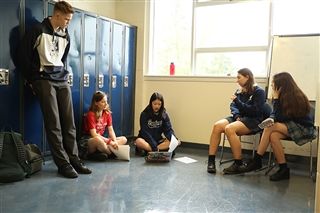Our intrepid Grade 11s have started their Individual Orals (IOs), which is an exciting component of their Language and Literature assessment and a rather unique aspect of an IB education. During the IO, students are required to deliver an oral response where they connect two studied texts through a global issue. Looking at their texts through the thematic lens of an ‘issue’, they are able to consider how literary and non-literary works help us to explore complex aspects of human experience, such as: “technology’s role in normalizing immoral acts,” or “how following a fate laid out for you rather than accepting your own free will leads to ruin,” or “how reinventions of our world seem to always perpetuate the same sexism and beauty standards”.
Students had to choose from the texts they had studied in class, but developing their own global issues allowed them to put their own spin on the analysis. Popular texts that students choose to compare in IB English Language and Literature were The Great Gatsby by F. Scott Fitzgerald and the Black Mirror episode ‘Nosedive.’
“My topic is based on how individual self-fulfilment and how the illusions we hold can prevent us from achieving it,” said Anton. “I cover how the illusion society puts on you can prevent you from achieving something.”
Rohan Bandechha also used the two texts listed above for his IO but compared them under the topic of greed.
“I’m comparing them under the topic of greed and how it bases your decisions and shifts what you do in life,” he said. “The real world application to it is you can see how some people will constantly chase after things and this changes their behaviour and decisions.”
Rebecca Palm, in the Literature course stream, explored how innate humanity makes people want to bring out the worst in others, which in turn brings out the worst in themselves. She used the texts, The Handmaid’s Tale by Margaret Attwood and the existential play No Exit by Jean-Paul Sartre.
“It’s kind of interesting to apply a real-world lens because you look at the negativity in people,” said Rebecca. “But also it’s twisted in literature because it’s so interesting to read flawed characters — but you want to see the good in people.”
Ruby Narte focused on the topic that the lack of female representation within spaces is, ironically, often caused by women in higher positions of power. Her texts were Persepolis by Marjane Satrapi and Penelopiad by Margaret Atwood.
“Looking at it through a real life lens, it’s an actual issue that women in marginalized groups experience all around the world. So it was interesting to look at it in two classic texts,” said Ruby.
Returning to the Language and Literature course stream, Seth Feldhun studied The Great Gatsby by F. Scott Fitzgerald and the Black Mirror episode ‘Nosedive,’ and explained what he learned overall from them was that what you see upfront is not necessarily the whole story.
“There is always a deeper meaning,” he said. “Nothing is obvious, and you need to keep digging deep — eventually you’ll be able to pull out an issue that is common throughout other stories.”
Keenan Warhurst said what he learned this year from studying The Great Gatsby was the deeper meanings of everything throughout.
“A lot of deeper meanings and double entendres that you don’t realize until you deeply analyze every small piece,” he said. “For example, I have a 40 line extract and I can talk about it for seven minutes, where until you do that you don’t think about the deeper meanings.”
With many of the students either finished or just wrapping up their Individual Orals, they had some tips and advice for their peers:
-
Don’t stress, you are given a long time to do this. Use class time productively and make sure you have great examples. Don’t focus on getting everything done fast, you can’t cram for this; you have to be able to manage your time well.If you like a text throughout the year, you are probably going to be using it in your IO. If you find one that’s interesting to you, pay attention and keep up with it and take notes.Everything we did this year built up to this. You are practising all of the techniques, so you should put effort into it so you can get those skills before the IO.It’s important to pay attention to all the different pieces you look at in your Grade 11 year. When it comes to the end you want to have as many choices as possible so you aren’t limited because you only read some of the books.Annotation is the most important part of IO. A lot of annotations makes it easier to analyze the text and pick ones you are interested in.Use the time you have in class well.There is no such thing as over annotating. You are going to continue to find new details to talk about, so a lot of re-reading when you choose your extracts.Improv is important since you aren’t writing down a script. You aren’t doing a presentation, but more of a speech and a Q&A session with the teacher.Starting with your bullet points, and practising with that early is critical. It’s all you’re going to have. Practicing with the materials you’ll have when doing the actual IO is very helpful.Your global issue can be a bit more flexible than you think. Don’t be afraid to tweak and change it as you make your points.Please join us in congratulating the Grade 11s as they leap over this assessment hurdle with style and grace! They have been working hard for the past month to be ready for a 10 minute speech, and if you catch them in the halls they just might recite it for you!





